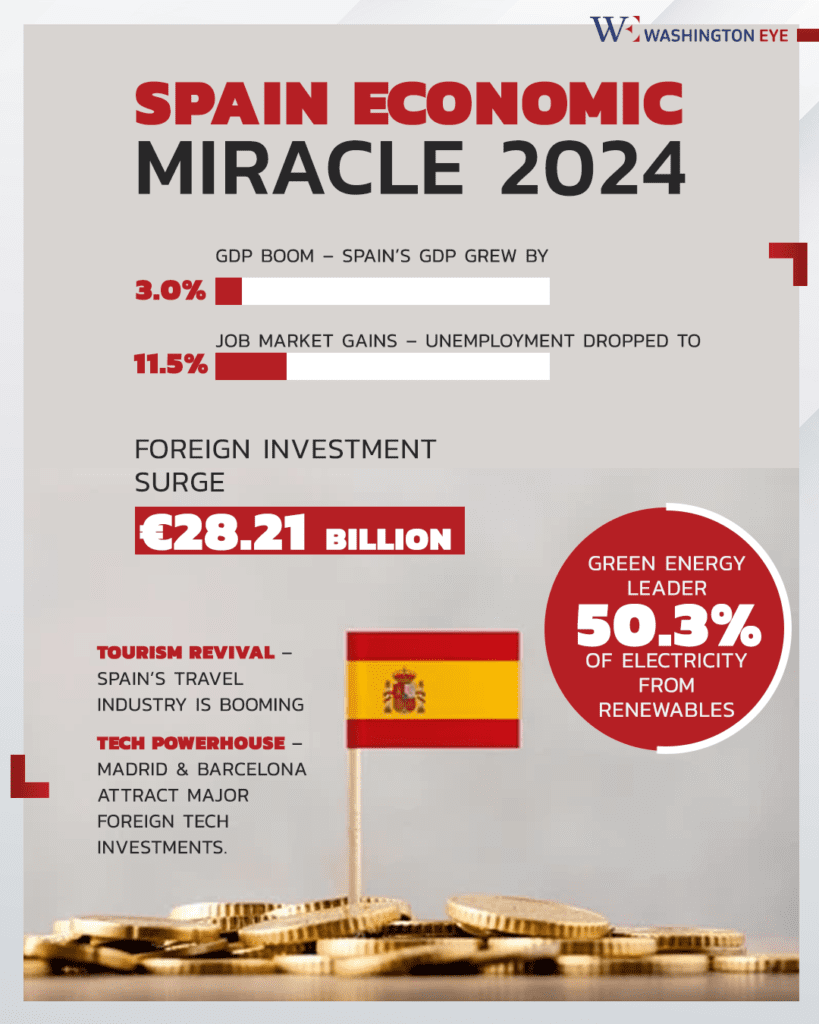Spain, once struggling under the weight of a financial crisis and plagued by high unemployment rates, is experiencing a remarkable economic transformation that has caught the attention of global analysts and policymakers.
After years of uncertainty, Spain is now witnessing robust economic growth, driven by domestic reforms, foreign investment, and the country’s ever-expanding digital and green sectors. Spain’s recovery began in earnest after the 2008 financial crisis, which hit the country hard. At the height of the economic downturn, Spain’s unemployment rate soared to over 26%, youth unemployment reached even higher levels, and its banking sector was on the verge of collapse.
The country was forced to adopt austerity measures, resulting in widespread public discontent. However, over the last decade, Spain has gradually rebounded, thanks to a mix of strategic reforms, a diverse economy, and the support of the European Union. Today, the Spanish economy is experiencing one of its strongest growth periods in years.
In 2023, Spain’s GDP grew by 2.2%, one of the highest rates among the major European economies. This economic revival is reflected in a declining unemployment rate, which has dropped to around 12%, down from its peak during the crisis. Spain’s economy in 2024 is marked by robust growth, with a 3.2% GDP increase, surpassing the European Union average.
This positive trend is driven by a strong recovery in the tourism sector, attracting record numbers of international visitors, and significant foreign investment in renewable energy. The unemployment rate has dropped to 11.21%, the lowest since 2008, thanks to the creation of around 468,000 new jobs, primarily in services.
Despite regional disparities, such as higher unemployment in areas like Cádiz, Spain is benefitting from its continued digital transformation and green energy push. Inflation has decreased, and fiscal policies are expected to reduce the general government deficit to 3% of GDP. Spain’s economic resilience in 2024 highlights its recovery from past crises and positions the country for long-term prosperity.
The Role of Foreign Investment
Foreign investment has played a critical role in Spain’s economic recovery. In recent years, the country has become a magnet for international capital, particularly in the tech, renewable energy, and infrastructure sectors.
Spain’s competitive labor costs, skilled workforce, and favorable business climate have made it an attractive destination for investors. One of the key drivers of Spain’s economic boom is its burgeoning tech sector. Madrid and Barcelona have emerged as vibrant tech hubs, attracting companies from all over the world.
Startups and established giants alike are flocking to Spain, taking advantage of the country’s dynamic workforce and a growing ecosystem of incubators, accelerators, and venture capital funds. In addition to technology, Spain has become a global leader in renewable energy.
The country’s commitment to green energy has resulted in a surge of investment in solar and wind energy projects. Spain is already one of the largest producers of wind energy in Europe, and its solar capacity is expanding rapidly.
This green transition not only helps the environment but also supports the economy by creating thousands of new jobs in the energy sector. The Spanish government’s focus on creating an attractive investment climate has also contributed significantly to the country’s economic turnaround.
Reforms to the labor market, tax incentives for businesses, and the launch of Spain’s “Startup Law” to encourage innovation have all played an essential role in attracting foreign capital.
Domestic Reforms and the Green Transition
Spain’s economic growth is not only a result of foreign investment but also of domestic reforms aimed at improving the country’s competitiveness. Over the past few years, the Spanish government has implemented labor market reforms that have made the job market more flexible and reduced the country’s dependence on temporary contracts.
These reforms have led to a rise in permanent employment and higher job security for workers. Furthermore, Spain is embracing the digital age with enthusiasm. Digital transformation has become a central theme of the Spanish economy, with initiatives to upgrade the country’s infrastructure and foster innovation.
Spain is one of the leading countries in Europe in terms of internet penetration, and its commitment to digitizing government services and businesses is helping to make the economy more efficient and productive.
The push toward digitalization has also given rise to Spain’s position as a leader in Artificial Intelligence (AI) research and development. Spanish universities and research centers are at the forefront of AI innovation, and Spain’s government has invested heavily in this sector, ensuring that the country remains competitive in the rapidly evolving digital landscape.
Another key factor driving Spain’s growth is its commitment to sustainability. The country has made a significant transition towards a green economy, heavily investing in renewable energy, sustainable agriculture, and eco-friendly infrastructure. This shift is not only beneficial for the environment but is also creating thousands of jobs, particularly in rural areas, where renewable energy projects are often based.
The Spanish government’s “Green Deal” is ambitious, aiming to cut carbon emissions to net zero by 2050. This initiative includes building a more sustainable transport network, enhancing energy efficiency in housing and industrial sectors, and increasing the production of green hydrogen. Spain’s position as a renewable energy leader is expected to continue to fuel its economic growth in the coming decades.
Challenges and Looking Ahead
Despite the impressive economic progress, Spain is not without its challenges. High levels of public debt, which increased during the financial crisis, remain a concern. Additionally, the country’s aging population poses long-term demographic challenges that could strain its social security and healthcare systems in the future.
Furthermore, inflation has been a concern for Spain in recent years, particularly as the country continues to navigate the aftershocks of the COVID-19 pandemic and global supply chain disruptions. While Spain has managed to contain inflation better than many of its European counterparts, it remains a key issue that policymakers will need to address.
Spain’s economic miracle is a testament to the country’s resilience and adaptability. From the depths of the financial crisis to the strong growth seen today, Spain has proven that it is capable of overcoming adversity.
The country’s future looks bright, with continued foreign investment, a thriving digital sector, and a green energy revolution driving its growth. If Spain can continue to build on these successes, the nation will likely continue to be a leader in Europe’s economic landscape for years to come.
While challenges remain, Spain’s economic trajectory indicates a future full of promise and opportunity.


















